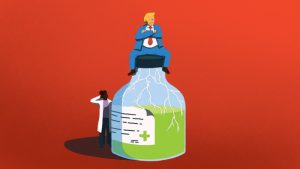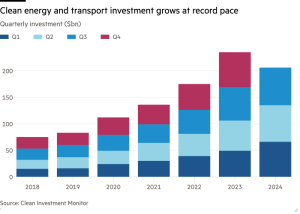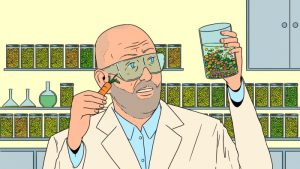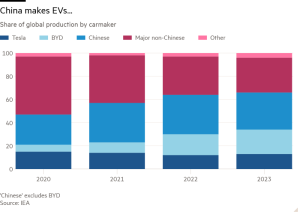Bird flu and mpox show little learnt from Covid about future pandemics
Since the Covid-19 emergency was officially declared over last year, the US has been gripped by one of the biggest bird flu outbreaks among farm animals in its history. The World Health Organization, meanwhile, just last month declared the mpox virus a new global health emergency, due to its rapid spread in central Africa.
For public health experts, outbreaks like these are a worrying sign of how little has been learnt from the Covid pandemic. “We should have realised we need to take outside chances more seriously and act more aggressively early to forestall these epidemics — and twice we haven’t done that,” says Scott Gottlieb, former US Food and Drug Administration commissioner.
Nominate a company as an FT ‘Reinvention Champion’

Do you know of a company that has made a clever shift in strategy or business model? If so, tell us via this online entry form (2 minutes to complete). We’ll reveal the FT’s Reinvention Champions on November 13.
In response to the H5N1 avian flu outbreak, which has spread to cattle herds in more than a dozen US states, in some cases affecting dairy workers, Gottlieb notes that US human and animal health authorities have struggled to co-ordinate their response, thus holding up testing efforts. The WHO, he adds, has been too slow to approve vaccines for mpox.
At present, the bird flu outbreak is still classified as a low risk to human health, while mpox — which produces a skin rash on infected individuals — relies on close contact in order to spread, reducing its pandemic potential. However, the key weapons that eventually helped to contain the Covid pandemic — well-resourced public health responses, testing and vaccines — have been slow to materialise in reaction to both of the more recent outbreaks.
At the same time, the WHO’s pandemic preparedness treaty negotiations continue to be hampered by delays and division between richer and poorer nations. This treaty, which was centred on the need for a co-ordinated international response to any future pandemic, is now not expected to be agreed until 2025 — far beyond the original deadline of May this year.
With climate change likely to increase the risk of viruses spilling over from animals, public health authorities are having to ask whether the world can respond fast enough when the next pandemic threat inevitably emerges.
“You can see that the pandemic response was, in part, political — and that hasn’t gone away,” points out Leif Erik Sander, chair of infectious diseases at Berlin’s Charité hospital.
In the US, the state of Minnesota, where eight cattle herds have been infected with bird flu, stands out for its aggressive response. Not only have its testing levels been higher than others in the US, but also it has provided grants for farms to procure deterrents — including lasers that scare off wild birds — and ensured cows can only participate in state fairs with a negative H5N1 test.

Minnesota’s public health system ranks among “one of the strongest in the country”, says Luciana Borio, a senior fellow for global health at the Council for Foreign Relations.
Elsewhere, though, the response has been much patchier, as health authorities have struggled to gain access to farms to test animals and workers. At times, the Centers for Disease Control and Prevention and the US Department of Agriculture have even struggled to work together, Borio says.
In Thailand, public health authorities have mobilised rapidly against mpox. After detecting a case of the new, more transmissible and deadly form of the disease, they reintroduced a screening process for travellers arriving from 42 affected countries.
“Within five days of the first case arriving into Thailand, [that case] had symptoms, [had] sought medical care, and the clinician was on alert,” says Rick Bright, former director of the US government’s Biomedical Advanced Research and Development Authority. “Then, within a week they had announced the results and shared the full [genome] sequence — that’s how it should work.”
As was the case during the Covid pandemic, however, access to vaccines for both bird flu and mpox has been greater for richer nations. Between them, the US and the European Union have bought up almost all available doses of the existing bird flu and mpox jabs.
To help African nations, such as the Democratic Republic of Congo, which are facing an upsurge of mpox cases, the US and the European Commission have pledged donations of the vaccine developed by Denmark-based biotechnology company Bavarian Nordic, the leading maker of mpox vaccines, but these doses pale in comparison with the size of their stockpiles.
One bright spot, however, is how the advancement of vaccine technology is likely to enable faster pandemic jabs in the future — largely thanks to the speed with which mRNA shots can be developed. The US government awarded Covid vaccine maker Moderna $176mn to research an mRNA bird flu vaccine.
Meanwhile, rival jab manufacturer BioNTech is collaborating with the non-profit Coalition for Epidemic Preparedness Innovations (Cepi) on an mpox mRNA jab.
Cepi’s efforts to fund early-stage clinical trials for a range of pandemic potential viruses, otherwise known as Disease X, will put “the world on a better footing to respond to the next pandemic”, argues Bright.
The need, however, for a significant increase in vaccine manufacturing across the world — especially in less developed regions, such as Africa — has “fallen down the priority list”, Bright warns.
“Let’s put our money where our commitments are, and let’s build regional capability and capacity,” he says.
Cepi, at the latest count, is only just over half way to a $3.5bn funding target to keep its plans on track through to 2027.
Nevertheless, Richard Hatchett, its chief executive, believes infectious diseases can only fall so far down the political agenda.
“It will be impossible for governments to neglect this for very long before something comes along and refocuses their attention on it,” he argues.
“I would like to believe that, over time, we won’t continue to have that ebb and flow,” Hatchett adds. But, if the attention ebbs too much, “nature will strike back.”
Letter in response to this article:
Cuts in foreign aid leave world more vulnerable / From Joe Cerrell, Managing Director Europe, Middle East & East Asia, Global Policy & Advocacy, Bill & Melinda Gates Foundation, London, SW1, UK
#Bird #flu #mpox #show #learnt #Covid #future #pandemics







